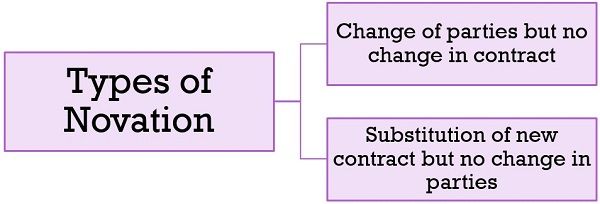 Novation is a situation in which a fresh contract is substituted for an old contract, between the same or different parties, whereas alteration is when there is a change in the terms and conditions of the contract.
Novation is a situation in which a fresh contract is substituted for an old contract, between the same or different parties, whereas alteration is when there is a change in the terms and conditions of the contract.
What is Discharge of Contract?
To put simply, discharge means cancel, hence discharge of a contract means its cancellation. When there is the cessation of contractual relation amidst the parties, i.e. promisor and promisee, it is called the discharge of contract. This means that the parties are no longer liable for the performance of the contract.
Therefore, with the discharge of the contract, the rights and obligations of the parties come to an end.
Modes of Discharge of Contract
- Discharge by Performance
- Discharge by Mutual Agreement
- Discharge by Operation of law
- Discharge by Impossibility of Performance
- Discharge by Lapse of Time
- Discharge by Breach
What is Discharge by Mutual Agreement?
When the contractual obligations between the parties are terminated by mutual agreement expressly or impliedly, it is called discharge by mutual agreement. Novation, Alteration, and Recission are three modes of discharge by mutual agreement.
This write-up will increase your knowledge on the significant differences between novation and alteration, using easily understandable examples.
Content: Novation Vs Alteration
Comparison Chart
| Basis for Comparison | Novation | Alteration |
|---|---|---|
| Meaning | When the parties give their consent to substitute the old contract with the new one, it is called Novation. | Alteration refers to modify or revise the terms and conditions of the contract, with the consent of the parties concerned. |
| Parties | Parties may be the same or different. | Parties remain same. |
| Terms and conditions | There may or may not be any changes in the terms and conditions of the contract. | Changes in the terms and conditions of the contract are always present. |
| Substitution of the new contract | New contract takes the place of old contract. | It may not always involve substitution. |
Definition of Novation
Novation implies the replacement of a fresh contract with the old or original one. The new contract may exist between the same parties or between different parties. There may or may not be any change in the terms of the contract. In addition, the discharge of the original contract acts as the consideration for the new contract.
It is worth noting that – novation is valid and enforceable only if all the parties to the contract give their consent to it, otherwise the old contract will stand valid.
Furthermore, novation takes place when the existing contract between two parties is terminated, in consideration of a fresh contract on similar grounds between one of the existing parties and a third party, or two completely new parties.
Novation of the contract must occur before the expiry of the term for the performance of the actual contract, if the parties fail to do so, it would result in a breach of contract. And, if a new contract is substituted after the expiry of the term, it would be entered into to adjust the remedial rights, occurred due to the breach of the contract.
Moreover, due to any reason the new contract remains unenforceable, the old contract revives and parties have to perform their respective obligations.
Types of Novation
- Change of parties but the contract remains the same: When there is a change in the parties to the original contract, but there is no change in the contract. In this condition, the original parties to the contract are discharged from performing their part of the contract. But here one should note that all the parties must agree to such change and formation of a new contract.
- Substitution of a new contract but no change in parties: If the parties to the contract agree to replace the existing contract with that of a new one. Therefore, the original contract is rescinded and does not require performance.
Example
Amit paid Rs. 20,000 to Vijay, as an advance for delivering Home Theatre System on Diwali. Vijay ordered the system. But as Amit owed Rs. 20,000 to his friend, the parties agreed that the system would be delivered to Amit’s friend’s house who will pay the remaining sum due to Vijay. Therefore, the existing contract will be substituted for a new one.
Also Read: Difference Between Unilateral and Bilateral Contract
Definition of Alteration
Alteration simply means variations in the terms of the contract. Alteration involves making changes in the old contract, i.e. adding new terms and conditions or modifying/removing the old ones with the mutual consent of the parties concerned. In this way, the original contract is rescinded as it does not need to be performed.
The mutual consent of the parties is required for the alteration in the terms of the contract and when the alteration is valid, the original contract is discharged and a new contract takes its place which is binding upon the parties concerned.
Hence, the parties are required to perform the new agreed terms and conditions of the contract only. However, there will be no change in the parties concerned.
Example
Mr. Jain is an event manager. Mr. Rao entered into a contract with Mr. Jain for his daughter’s wedding on 10 April 2020 in Bengaluru. But due to nationwide lockdown, the wedding date is shifted to November 2020 at Kolkata. And, the parties i.e. Mr. Jain and Mr. Rao agreed to continue the contract on the agreed terms. This would amount to alteration.
What is Material Alteration?
Material Alteration is a type of alteration in which the legal effect of the contract changes. Material Alteration is covered under the discharge of contract by the operation of law.
For Example: Change in the rate of interest.
Now the question is – what is an immaterial alteration?
Well, any such alteration related to the correction of a clerical error in the figures mentioned or correction in the spelling of the party’s name, is regarded as immaterial alteration. These alterations have no effect on the contract’s validity, as well as technically, these do not mean alteration.
Also Read: Difference Between Agreement and Contract
Key Differences Between Novation and Alteration
In the points given below, we have discussed the differences between novation and alteration in detail:
- Novation is when all the parties to the contract give their consent for the substitution of the existing contract for a novel contract. On the other hand, alteration means changing the terms and conditions of the contract, after all the parties agree to such changes.
- In novation, the fresh contract is between new parties or same old parties or one new and one old party. As against, in case of alteration, there is no change in the parties to the contract.
- In case of novation, the terms and conditions of the contract may or may not be changed. However, alteration of the contract is always due to the changes in the terms and conditions of the contract. Further, alteration is a part of novation.
- Novation involves the substitution of the new contract with the existing one, whereas alteration does not always involve substitution of the new contract with the old one as there may be some changes in the terms and conditions of the main agreement only.
Example
- Novation
Praveen promised to sell his car to Bose on 30th June, as Praveen owed 3 lakhs to Bose. But before the expiry of the term, it was decided to substitute a new contract because Dev owes Rs. 5 lakhs to Praveen and Bose owes Rs. 3 lakhs to Shrikant. the parties mutually agreed that Dev would pay Rs. 3 lakhs to Shrikant. - Alteration
Lee is a software engineer, who entered into a contract with JHK Bank, to develop an application for the bank, for Rs. 1,50,000 by the end of December 2021. Subsequently, the parties mutually agreed that the app can be developed by February 2022.
Also Read: Difference Between Void Contract and Voidable Contract
Conclusion
If there is no change in the parties then the nature of obligation needs to be altered substantially in the new contract, indicating the simple variation on the contractual terms. And so when the parties do not change it is alteration and not novation.







Leave a Reply